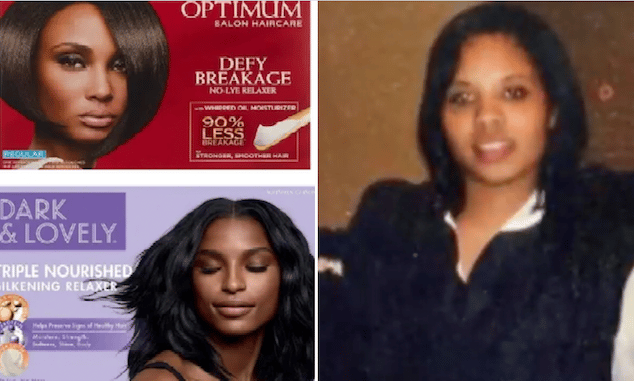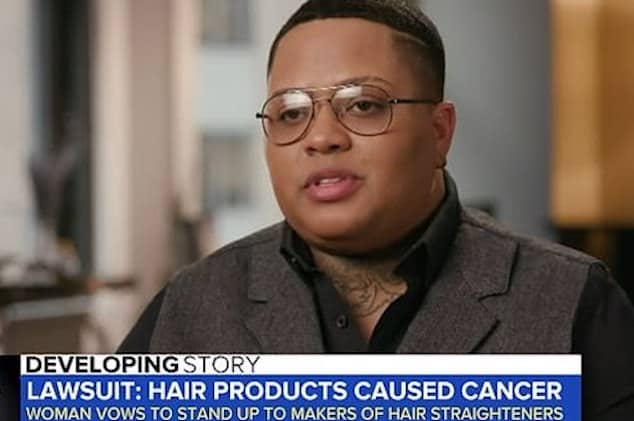

Jennifer Mitchell Missouri black woman files lawsuit against L’Oreal and four other cosmetic manufacturers alleging properties inside hair straighteners led to her having uterine cancer and unable to conceive.
A Missouri woman has filed a lawsuit against 5 cosmetic companies, including L’Oreal, claiming chemicals in its hair straightening products left her with womb cancer and unable to have children.
Jennifer Mitchell, 32, of St Louis, was diagnosed with the disease in 2018 and forced to have a hysterectomy — depriving her the ability of ever conceiving naturally.
She started using chemical hair straightening products in 2000 when she was in third grade and had no family history of cancer.
‘Society has made it a norm to look a certain way in order to feel a certain way,’ said Mitchell while flanked by her attorneys outside Illinois courts on Monday.
Mitchell alleges her diagnosis was ’caused by regular and prolonged exposure to phthalates and other endocrine disrupting chemicals’ found in L’Oreal products.
NIH study finds link between chemical straighteners to uterine cancer
Her lawsuit, filed in Illinois federal court, comes a week after a Government-funded study linked chemical straighteners to womb cancer for the first time.
It found people who used the products more than four times a year were twice as likely to develop uterine cancer than those who rarely used them.
Scientists cannot be certain the products cause cancer but they found a ‘probable’ link.
In the National Institutes of Health (NIH) study, researchers monitored around 33,000 women for more than a decade.
The rate of uterine cancer was 4.05 per cent in women who used straightening products four or more times a year compared to 1.64 per cent in those who didn’t.
Scientists said at the time ‘more research’ was needed to confirm the findings, but that the results were ‘concerning’.
There are around 66,000 new cases of womb cancer every year in the US, making it the most common cancer of the female reproductive system.
Black women bear higher incidence of uterine cancer and shorter life outcome
About 81 per cent of patients live for at least five years after their diagnosis, according to the American Society of Clinical Oncology.
But for black women the rate falls to 63 per cent, which experts say is because they are more likely to be diagnosed with an aggressive form.
Mitchell, from Waynesville, said she was ‘shocked’ after learning about the study and thought ‘this could be an answer to my diagnosis.’
Told Mitchell via Good Morning America: ‘Not being able to carry my own children has been the hardest thing that I’ve ever had to deal with. This is a dream of mine that I’ve always wanted.’
Mitchell who is being represented by famed civil rights attorney, Ben Crump is also suing four other companies — Carson Inc in Georgia, Strength of Nature Global in Georgia, Dabur USA in New Jersey and Namaste Laboratories in Illinois.
Crump maintains the beauty companies should have been aware of the potential health risks of their products, particularly to black women — who often use their products more frequently and whose marketing typically targets black and or ethnic women.
Aggressive marketing towards black women
‘Black women have long been the victims of dangerous products, specifically marketed to them,’ Crump told congregants outside of courts on Monday.
‘We will likely discover that Ms Mitchell’s tragic case is one of countless cases in which companies aggressively misled Black women to increase their profits.’
‘Millions of little girls have this put on their head at 7, 8, 9 years old, sometimes twice a month or every other month,’ said attorney Diandra Debrosse Zimmerman.
In her case filed to the Northern District of Illinois federal court, Mitchell said her cancer was ‘directly and proximately caused by her regular and prolonged exposure to phthalates and other endocrine disrupting chemicals’ found in L’Oreal products.
She is seeking more than $75,000 in compensation.
Ms Mitchell started using the products around once a month when she was about 10 years old.
But at the age of 28 she was given a devastating diagnosis.
She went for a full hysterectomy — which involved removing the womb and cervix — to get rid of the cancer.
She kept using the products, however, until March 2022, unaware that they could be behind her cancer.

Chemicals in relaxers were just found to increase the risk of uterine cancer. Toxic levels of BPA were found in sportsbras sold by the biggest brands. Almost everything is riddled with endocrine disruptors, it’s no wonder women keep having hormonal+fertility issues, PCOS, & endo.
— nikki (@ateenyalien) October 20, 2022
‘At age 28, my dream of becoming a mom was gone…’
Offered Mitchell, while flanked by her supporters on Monday: ‘I’m from a big family, I have six sisters, and that was something that I have always dreamed of becoming was a mother
‘I go in for my first appointment and as in most consultations they do what they call is a vaginal ultrasound.
‘During that appointment, he saw something that day — and he had to do a biopsy because he saw something in my uterine lining.
‘Three days later I got a call, I am 28 years old and i was just diagnosed with uyterine cancer.
‘It was recommended that I have a full and total hysterectomy and in September 2018 that is when I had a full and total hysterectomy.
‘At that time bat the age of 28 my dreams of becoming a mother were gone.
‘I am 32 years old right now, and I am still feeling that void of not being able to bear my own child.’
The case accuses L’Oreal and the other four companies of failure to warn consumers, negligent failure to warn, selling products with a design of manufacturing defect, gross negligence and negligent misrepresentation.
It also accuses them of committing fraud, fraudulent concealment, breach of warranties and a negligent failure to recall.






